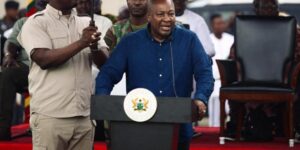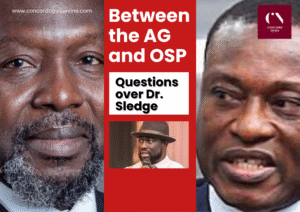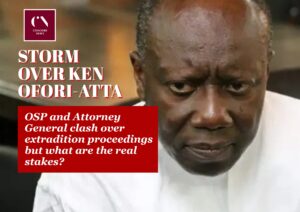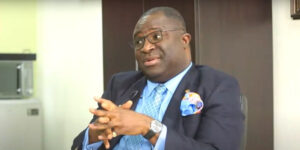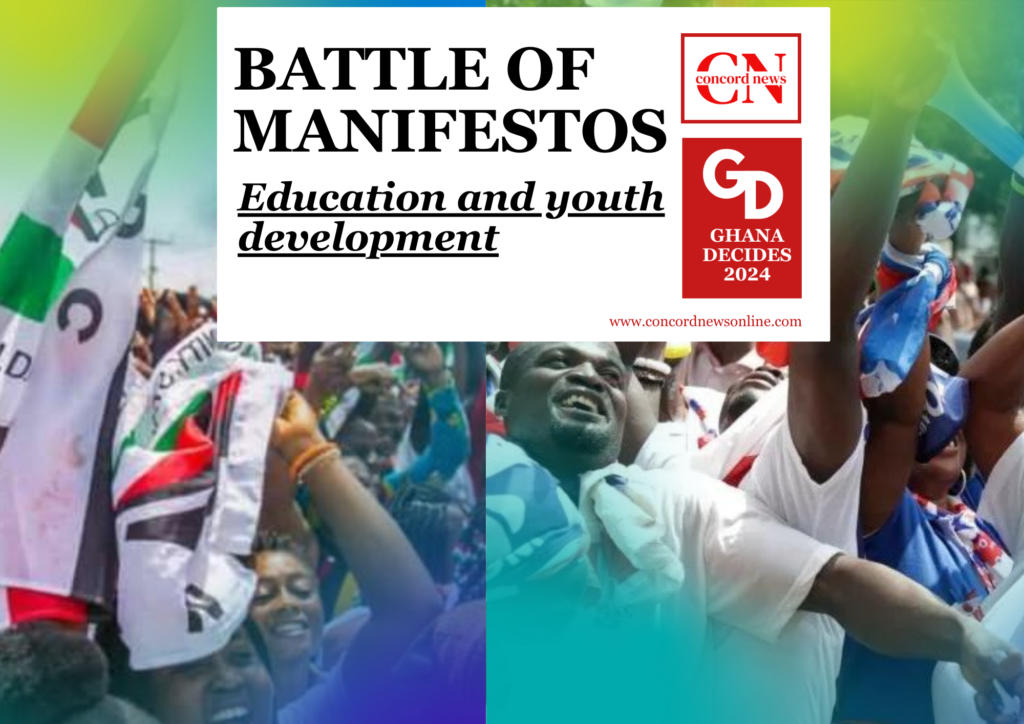
Political Editor, KOBBY DEAN, in the first of a three-part series analyses the manifestos of the two main parties, the NPP and the NDC as they articulate their vision for the country in the run-up to Election 2024.
The past two weeks have witnessed intense debate over two manifestos of the two leading political parties in the country: the NPP and the NDC.
The NDC started with a Youth Manifesto that targeted the youth and highlighted critical issues the NDC believed would help develop the youth. Obviously, it was a very strategic move by the NDC. The youth remain a very critical constituency in the election: perhaps, the most important and vibrant group of voters whose influence is very central to every electoral outcome.
Battle for the youth
Many political analysts state clearly that the ability to attract the youth is the very first step towards electoral victory. The NPP’s Free Education policy has given them some good influence among young voters and their parents who have benefitted from the policy. Despite the challenges that have emerged since the policy was introduced, it has still been touted as a very good policy and the NDC has been at the receiving end for not been the first to implement it. The NDC disagrees though arguing that they had conceived the idea and made some commitments in that regard.
The attempt by the NDC to claim a piece of the Free SHS clearly demonstrates the influence of the policy and the determination to ensure that the party makes a claim that sets it on the path of popularity among the youth.
The NDC Youth Manifesto was carefully crafted to respond to the criticism of the NDC apparent nonchalant attitude towards the Free SHS when it was first touted by the then Presidential Candidate of the NPP, Nana Akufo Addo in run-up to the 2012 elections. Indeed, those conversant with the 1992 Constitution know very well that the conception of free JHS, SHS and even tertiary education was neither the brainchild of the NPP or the NDC; it was the work by the framers of the Constitution. The Constitution in Article 25 clearly states that states that education shall be made accessible to all on the basis of capacity and by the progressive introduction of free education.
The issues of capacity and progressiveness are important, hence, one of the key targets of every government is to make the determination as to whether there is the economic capacity to make education free. The NPP made the determination and decided that SHS could also be made free. As to whether there was the economic capacity and whether it was progressively done have been issues of debate, but the Free SHS policy has been a successful political message. The Youth Manifesto of the NDC responds to this deficiency of the party as it promises to scrap academic fees for the first year of all students who gain admission into public universities. This was a policy statement that obviously caught the NPP off-guard. Some analysts say the launch of the NDC Youth Manifesto unsettled the NPP in the days leading to the launch of their manifesto compelling their presidential candidate, Dr. Mahamudu Bawumia to suspend his campaign and focus on ‘fine tuning’ their manifesto ahead of the launch.
The NDC also promised other significant policies in their youth manifesto: Abolition of betting tax, reduction in data cost and free Wi-Fi in schools, and the training of one million young people in digital skills under the ‘One Million Coders’ programme, something the NDC says would be very vital for the youth in the pursuit of the 24-hour economy.
NPP’s Response
For many this was a very smart move by the NDC and hit at the core of the electorate. The NPP’s response has not been exactly dominant but the NPP also announced a policy to train one million youth in digital skills. Similarly, the NPP has expressed an intention to abolish the betting tax. The NPP’s Manifesto also focuses on more digital interventions such as the establishment of a National Robotics, Engineering, and AI Lab for research and training of young Ghanaians locally. The manifesto is also heavy on support for start-ups which presumably would be anchored by many young entrepreneurs.
Both parties promise free tertiary education for Persons With Disability (PWDs), but the NDC has indicated a commitment to introduce a National Apprenticeship Programme that is geared towards generating self-employment by providing free technical and vocational training for young people in various crafts. That policy presents an opportunity for many young people facing challenges in the self- improvement and economic empowerment. The NPP’s Manifesto faces challenges in this area as its detailed emphasis on digital education, innovation and entrepreneurship, though important, may not address the vital needs of a very large proportion of uneducated youth with very little digital literacy who are in search of jobs.
Both parties make bold statements in the area of education. The NDC’s commitment to uphold and even better the free SHS policy in addition to its commitment to make first year of public university education free of academic fees may appeal more to young electorates and parents seeking to place their wards in public universities.
The NDC offers a more comprehensive policy on education and its manifesto even targets childhood education with what it describes as the ‘Brighter Beginnings Initiative’.
Government Scholarships
The issue of government scholarships plays out well in both manifestos, yet, strikingly, both manifestos fail to adequately address the issue of full scholarship for tertiary education to needy but brilliant students. While the NDC promises to “introduce legislation to streamline and regulate the awarding of government scholarships and prohibit the award of scholarships to political appointees”, it falls short of making bold statements in addressing the issue of waste and abuse in the government scholarship scheme, particularly, in the area of the award of scholarship for international study. The limitation to political appointees without the inclusion of politically exposed persons also raises some questions.
The NPP which has suffered backlash in the award of scholarships provides an even more vague policy when it states that it would “integrate scholarship databases across all the public sector institutions managing such schemes, to ensure full visibility”. There is no clear commitment to address the issue of waste and abuse in the award of scholarships.
Teachers
The NDC strategically targets teachers and while the proposed policies are audacious, there have been questions as to whether the party can really deliver on its promises. The NDC says it can deliver. In this area, the NDC manifesto focuses on the wellbeing of teachers with policies such as accommodation for teachers, promotion for teachers, special allowances for teachers to accept postings into rural areas and a scheme to help teachers own their own vehicles. The party has also committed to abolish the Teacher Licensure Exams and the prompt employment of qualified teachers. Additionally, the NDC has proposed the introduction of a National Research Fund that may be attractive to tertiary education teachers.
The NPP does not articulate very strong commitments to teachers who form a very critical part of the education ecosystem.
- Next week, we will focus on Economy (including Digital Economy), Jobs and the Energy Sector.

